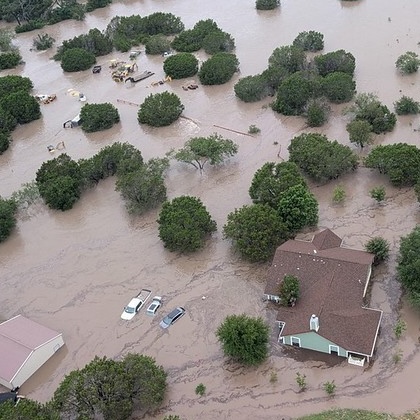Science
Climate Crisis Deepens: 2024 Sets Record as Hottest Year

A recent report from an international coalition led by scientists from Oregon State University reveals that 2024 has been the hottest year on record, likely the warmest in over 125,000 years. The findings, published in the journal BioScience, highlight alarming trends in the climate crisis, with 22 out of 34 critical planetary indicators reaching unprecedented levels.
Co-lead author William Ripple warns that without immediate and effective strategies, the world is on a perilous path that could endanger systems of governance and public health. “We’ll be on the fast track to climate-driven chaos, a dangerous trajectory for humanity,” Ripple stated. Despite these grave concerns, he emphasized that it is not too late to mitigate some of the damage, even if the temperature targets outlined in the 2015 Paris Agreement are missed.
The report underscores the urgency of implementing robust climate mitigation and adaptation strategies. Ripple advocates for integrating climate resilience into national defense and foreign policy and calls for grassroots movements focused on socially just transitions away from fossil fuels.
Key Findings and Recommendations
The report draws on global data from the Intergovernmental Panel on Climate Change, outlining several high-impact strategies to combat the climate crisis. Among these are:
1. **Energy Transition**: Transitioning to renewable energy sources like solar and wind could potentially provide up to 70% of global electricity by 2050. The report highlights that a rapid phaseout of fossil fuels would have a significant impact on climate mitigation.
2. **Ecosystem Protection**: The protection and restoration of critical ecosystems, such as forests and wetlands, could remove or avoid approximately 10 gigatonnes of carbon dioxide emissions annually by 2050. This would not only aid in reducing emissions but also enhance biodiversity and water security.
3. **Food Systems Reform**: Addressing food waste, which currently contributes 8-10% of global greenhouse gas emissions, and promoting plant-rich diets can significantly lower emissions while improving health and food security.
Co-lead author Christopher Wolf highlighted that humanity is in a state of ecological overshoot, with resources being consumed faster than they can be replenished. He noted that population growth, livestock numbers, and meat consumption are all at record highs, with an additional 1.3 million people and 500,000 livestock added each week.
Urgency of Action
The report also notes that fossil fuel energy consumption reached a record high in 2024, while combined solar and wind energy consumption, although setting a new record, remained significantly lower at 31 times less than fossil fuel usage. The acceleration of warming is attributed to reduced aerosol cooling and changes in cloud feedback.
The findings are underscored by a series of devastating weather-related disasters, including flooding in Texas that resulted in at least 135 fatalities and wildfires in Los Angeles causing damages exceeding $250 billion. Typhoon Yagi also tragically claimed over 800 lives in Southeast Asia.
The report warns that even small reductions in temperature increases can dramatically lessen the risks associated with extreme weather events, biodiversity loss, and food and water insecurity. Delaying action could lock in higher costs and more severe impacts, while swift, coordinated measures can provide immediate benefits to communities and ecosystems worldwide.
Ripple concluded by asserting the availability and cost-effectiveness of climate mitigation strategies, urging for bold and urgent action. “The cost of mitigating climate change is likely much smaller than the global economic damages that climate-related impacts could cause,” he stated.
As the world grapples with these findings, the call for transformative changes across society becomes increasingly critical. Achieving climate justice and promoting sustainable practices will be essential in mitigating the impending impacts of climate change.
-

 World2 weeks ago
World2 weeks agoGlobal Air Forces Ranked by Annual Defense Budgets in 2025
-

 World2 weeks ago
World2 weeks agoMass Production of F-35 Fighter Jet Drives Down Costs
-

 Top Stories2 weeks ago
Top Stories2 weeks agoNew ‘Star Trek: Voyager’ Game Demo Released, Players Test Limits
-

 Top Stories2 weeks ago
Top Stories2 weeks agoDirecTV to Launch AI-Driven Ads with User Likenesses in 2026
-

 Science2 weeks ago
Science2 weeks agoTime Crystals Revolutionize Quantum Computing Potential
-

 World2 weeks ago
World2 weeks agoElectrification Challenges Demand Advanced Multiphysics Modeling
-

 Lifestyle2 weeks ago
Lifestyle2 weeks agoLia Thomas Honored with ‘Voice of Inspiration’ Award at Dodgers Event
-

 Entertainment2 weeks ago
Entertainment2 weeks agoFreeport Art Gallery Transforms Waste into Creative Masterpieces
-

 Lifestyle2 weeks ago
Lifestyle2 weeks agoDiscover Reese Witherspoon’s Chic Dining Room Style for Under $25
-

 Health2 weeks ago
Health2 weeks agoGavin Newsom Critiques Trump’s Health and National Guard Plans
-

 Entertainment2 weeks ago
Entertainment2 weeks agoFast & Furious Coaster Hits the Track at Universal Studios
-

 Health2 weeks ago
Health2 weeks agoResearchers Uncover New Insights into Cancer Mortality Causes









